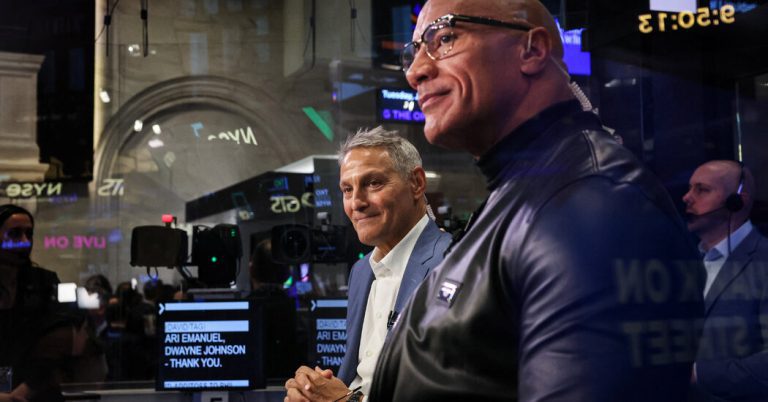Endeavor, the sports and entertainment company led by Hollywood mogul Ari Emanuel, said Tuesday it plans to go private, nearly three years after going public.
The transaction – led by Silver Lake, the investment firm that has been Endeavor’s longtime financial backer – is intended to usher in a new era for Endeavor, whose ambitious growth story has failed to gain traction on Wall Street.
Under the terms of the deal, Silver Lake will buy the Endeavor stock it does not already own for $27.50 per share in cash. That price is 55 percent higher than where Endeavor’s shares were trading on Oct. 25, a day before the company said it was weighing deal options.
The transaction values Endeavor at approximately $8.2 billion. Including its debt, the company is valued at $13 billion, making it among the largest acquisitions by a private equity firm this year.
For more than a decade, Mr. Emanuel and his business partner, Patrick Whitesell, have tried to turn what had started as a talent agency — with clients including Dwayne Johnson and Ben Affleck — into a new kind of media powerhouse: an organization that included not only the top talent in sports, entertainment and fashion, but the content businesses to showcase that talent. It was a vision that differed from competitors like Creative Artists Agency, which also hired outside investors but stuck very much to a traditional agency business.
Guiding the company was the unlikely pairing of Mr. Emanuel, satirized by Jeremy Piven on HBO’s “Entourage” as a hyper-aggressive yeller, and Egon Durban, the mastermind behind some of Silver Lake’s biggest deals.
Silver Lake invested in Endeavor in 2012, with Mr Durban in a senior advisory role. A flurry of acquisitions followed, including IMG, an agency focused on sports and fashion. Professional bull riders. New York Fashion Week? and technology for sports betting.
Most notably, Endeavor bought the Ultimate Fighting Championship for $4 billion in 2016, banking on the power of mixed martial arts to draw in live entertainment dollars. Last year, Endeavor bought World Wrestling Entertainment to combine it with the UFC into a publicly traded company called TKO Group, hoping to generate even more profit from selling rights to live matches.
But some of the bets aren’t quite settled.
While Endeavor once hoped to profit from “packaging” — the creation and sale of content that connected writers with other clients — a dispute with writers’ unions forced it to sell a majority stake in its in-house studio.
And while Endeavor believed TKO Group would be a strong draw for Wall Street investors, the company’s shares remain below their debut price. (This company will remain publicly traded.)
Endeavor executives also hoped that selling a majority stake in Creative Artists Agency to François-Henri Pinault, the French luxury tycoon, at a lavish $7 billion valuation would help lift their own company’s valuation. But Endeavor shares fell after the deal was announced.
The hope now is that with the delisting, Endeavor can continue to make ambitious investments without being undervalued by public market shareholders. He will continue to have the support of Silver Lake, which effectively doubles Mr. Emanuel, Mr. Whitesell and their team.
“This is a very special partnership,” Silver Lake’s Mr. Durban, who is also chairman of Endeavor, said in a statement. “We are working with the Endeavor team and our trusted investors to create value by accelerating growth at scale.”
Silver Lake is now deeply committed to Endeavor’s success: It already controlled about 70 percent of Endeavor’s voting rights and has said it has no interest in selling its stake in the company. However, the deal was discussed with a special committee of independent directors of Endeavor on behalf of other shareholders.
Silver Lake knows how to take great companies private, revamp them and take them public again. He helped Michael S. Dell, the tech mogul, buy out other shareholders in the company that bears his name and bring it back to the stock market.
Mr Dell’s family office, DFO Management, is helping finance the transaction, along with Mubadala, Abu Dhabi’s sovereign wealth fund. the investment firm Lexington Partners; and the asset management arm of Goldman Sachs.




